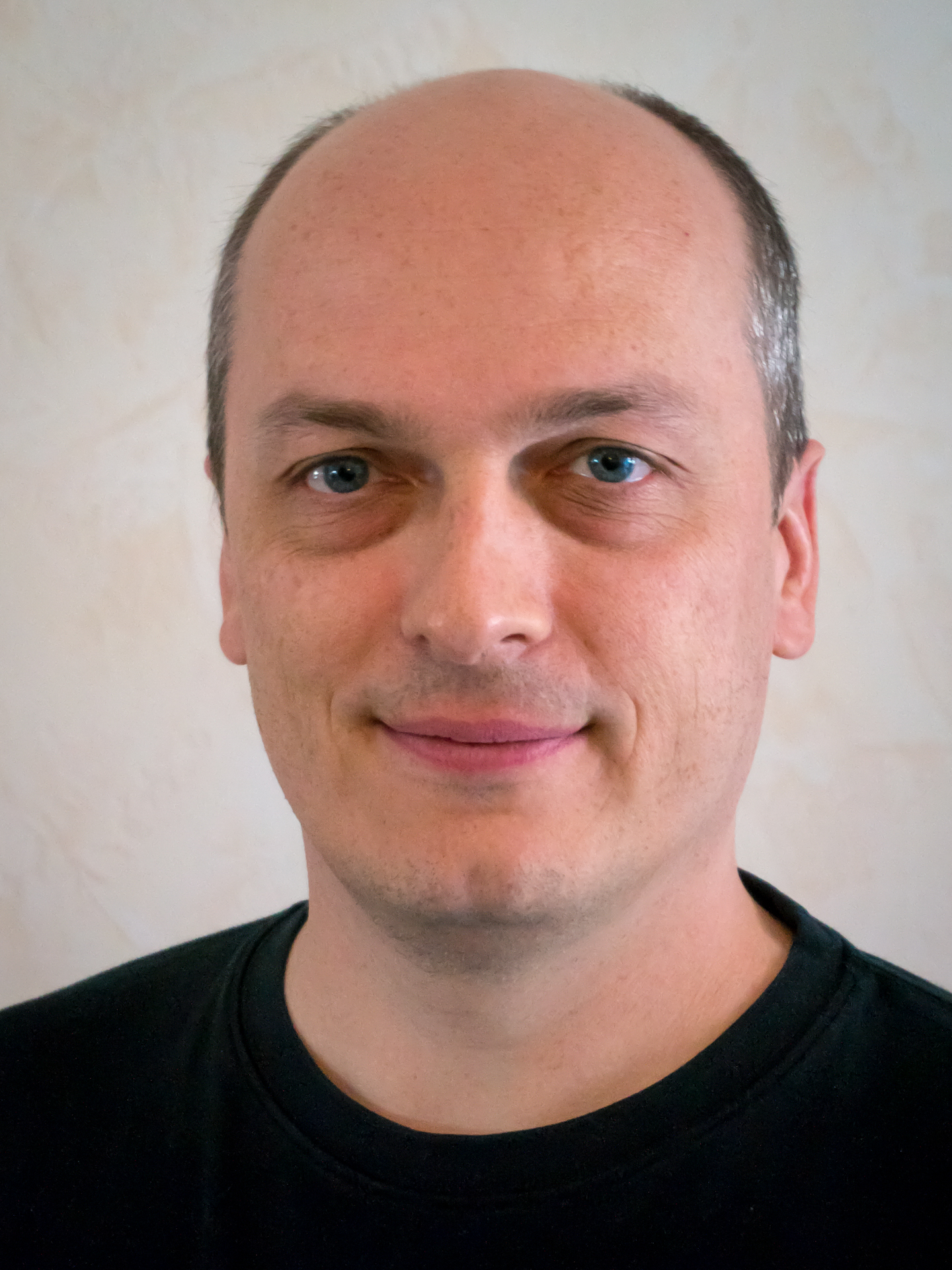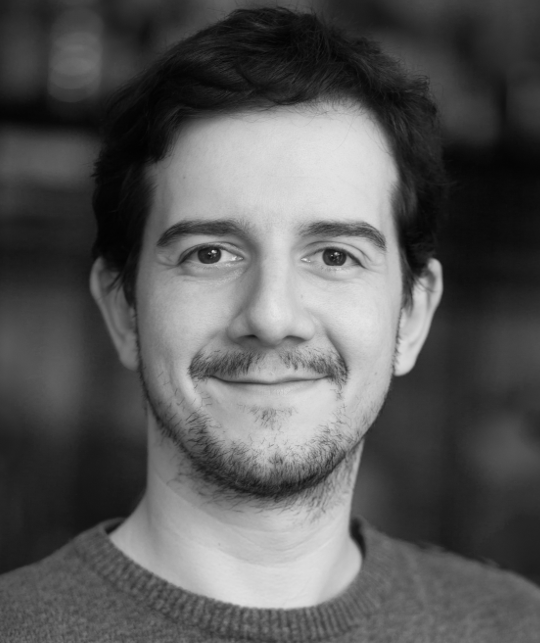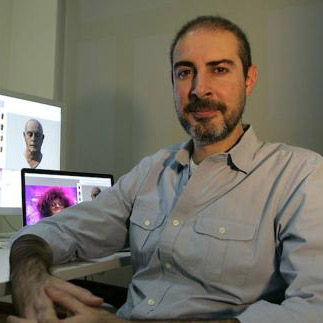Prof. Eric Galin – LIRIS – CNRS
 Título : Scenic Landscapes
Título : Scenic Landscapes
Resumen: While three-dimensional landforms, such as cave networks, arches, and overhangs occupy a relatively small proportion of most computer-generated landscapes, they are distinctive and dramatic and have a crucial visual impact. The dominant heightfield representation of terrain precludes such features, and existing volumetric structures such as voxels are memory intensive to handle large scenes.
In this talk, I will present skeletal implicit surfaces as a powerful and compact model lending itself to representing a range of landform features. I will show how it is possible to combine geologically-based simulations and artist-oriented authoring to synthesize scenic landscapes with such diverse structures as slot canyons, sea arches, stratified cliffs, fields of hoodoos, and karstic cave networks.
Bio: Eric Galin is a Professor of Computer Science at University Lyon 1, France. He obtained an engineering degree from Ecole Centrale de Lyon in 1993 and a Ph.D. in Computer Science from Université Lyon 1 in 1997.
His research interests embrace procedural modeling of virtual worlds, simulating natural phenomena, and modeling with implicit surfaces. For the past decade, he contributed to several high-level procedural methods for modeling terrains, generating road networks and villages, generating river networks and simulating the mutual influence between ecosystems and terrains.
Eric Galin served in several program committees such as SMI, Eurographics and the series of Eurographics Workshop on Natural Phenomena. He was the co-chair of Eurographics 2017 conference. He participated in the creation of the French Chapter of Eurographics in 2004 and belongs to the CA. From 2008 to 2013, he was the administrator of Gamagora, a high-level education program connecting Level Design, Graphics Design and Computer Game Programming tracks.
More info: https://perso.liris.cnrs.fr/eric.galin/
Dr. Ferran Argelaguet – Hybrid research team, Inria
Título: The Infinite Loop
Resumen: Las interacciones cotidianas se rigen por un bucle infinito, el bucle de percepción-acción. Este bucle funciona sin cesar en todo momento, el cerebro recibe y procesa estímulos externos, determina que acciones quiere/necesita realizar y las ejecuta. Dichas acciones generan estímulos adicionales que cierran el bucle. El bucle de percepción-acción modela un proceso complejo que está delimitado por las habilidades perceptivas, cognitivas y motoras de cada uno de nosotros. En la vida real, este bucle se desarrolla sin intermediarios, percibimos y actuamos en el mundo real directamente. Sin embargo, cuando nos sumergimos en la realidad virtual, el bucle de percepción-acción es distorsionado debido a las limitaciones de los dispositivos de realidad virtual. Esta charla abarcará un conjunto de trabajos de investigación con el objetivo final de concebir interfaces de usuario 3D adaptativas. Interfaces conscientes de las capacidades de percepción e interacción de los usuarios. Interfaces capaces de ayudar al usuario de manera transparente al interaccionar en mundos virtuales. A diferencia de las interacciones cotidianas, que están limitadas por las leyes de la física, las interacciones en entornos virtuales sólo están limitadas por nuestra imaginación.
Bio: Dr. Ferran Argelaguet is a Research Scientist at the Hybrid research team, at Inria, the French National Institute for Research in Computer Science and Control, in Rennes, France. He received his bachelor’s degree in Computer Science from the Universitat Politècnica de Catalunya in 2006 and his PhD in Computer Science in 2011. His research activity is devoted on the field of Virtual Reality, a multidisciplinary research field, with a particular focus on Human Computer Interaction and Human Perception. He publishes regularly in top VR conferences and journals, such as IEEE VR or IEEE TVCG. He also serves regularly as international program committee member in VR conferences such as IEEE VR or ACM VRST and since 2019 he is Program Co-Chair of the IEEE Virtual Reality and 3D User Interfaces Conference track.
More info: https://team.inria.fr/hybrid/author/fargelag/
Marcos Fajardo – Solid Angle
Título: Imágenes y Animación
Bio: Marcos Fajardo, ex-alumno de la Universidad de Málaga, es el fundador de Solid Angle SL (ahora parte de Autodesk, Inc.) donde dirigió el desarrollo de Arnold, un software de trazado de rayos para la renderización de imagenes 3D en cine y TV. Arnold se ha usado en proyectos como Gravity, Blade Runner 2049, Juego de Tronos, Pocoyó, y en multitud de películas del universo cinematográfico de Marvel como The Avengers, Iron Man 3, o Spider-Man: Into the Spider-Verse. Anteriormente, fue arquitecto de software en Sony Pictures Imageworks, investigador asociado en el Institute for Creative Technologies de la Universidad del Sur de California junto al Dr. Paul Debevec, y consultor en varios estudios de producción 3D. En 2017, Marcos y su equipo recibieron el Oscar de la Academia de Hollywood en la categoría Científica y de Ingeniería por su trabajo con Arnold. Mas recientemente, Marcos ha coproducido proyectos como el cortometraje “La Noria”.
More info: https://www.arnoldrenderer.com/

